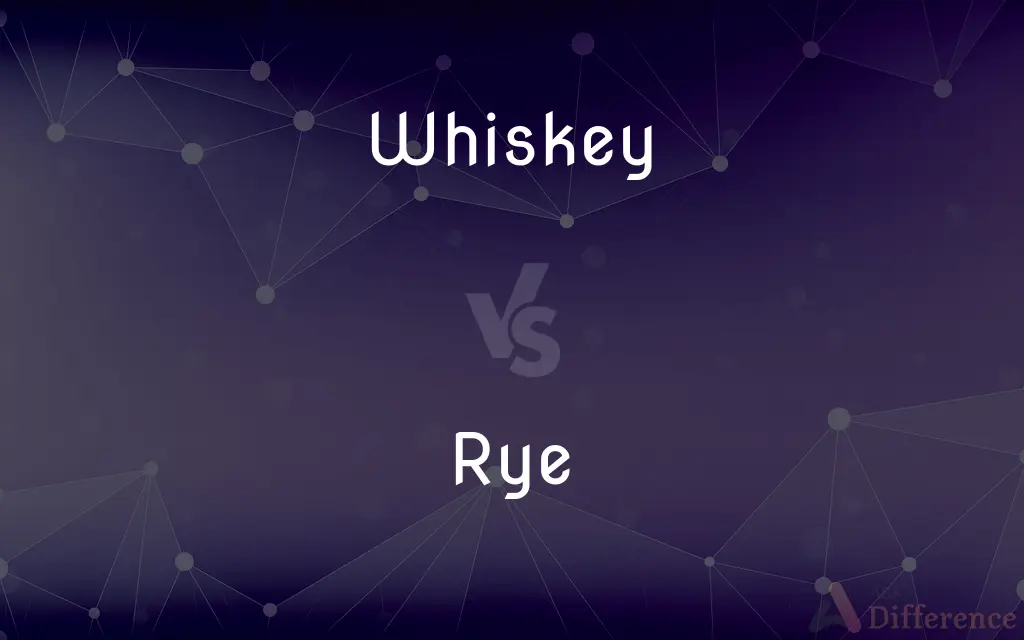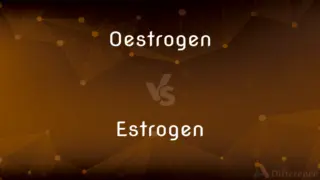Whiskey vs. Rye — What's the Difference?
By Fiza Rafique & Maham Liaqat — Updated on March 11, 2024
Whiskey is a distilled alcoholic beverage made from fermented grain mash, while rye refers to a type of whiskey made primarily from rye grain.

Difference Between Whiskey and Rye
Table of Contents
ADVERTISEMENT
Key Differences
Whiskey encompasses a broad category of spirits that are made from various grains, including barley, corn, rye, and wheat. The process involves fermenting the grain mash, distilling the liquid, and then aging it in wooden barrels, which gives whiskey its distinct flavor profile. Rye whiskey, specifically, is made predominantly from rye grain, which must constitute at least 51% of the grain mash in the United States. This type of whiskey is known for its spicier and more robust flavor compared to those made primarily from corn or barley.
While all rye whiskey is whiskey, not all whiskey is rye. The distinction lies in the grain composition and the resulting flavor profile. Rye imparts a distinctive spicy and fruity taste, which sets it apart from other types of whiskey that might be smoother or sweeter, depending on the predominant grain used in production.
The aging process also plays a crucial role in defining the flavor of both whiskey and rye. The type of wood used for the barrels, the duration of aging, and the environment in which the barrels are stored all contribute to the complexity and richness of the final product. However, the initial grain mash composition remains a defining factor in distinguishing rye whiskey from other whiskey varieties.
Understanding these differences is essential for appreciating the diverse world of whiskey, where each type offers a unique tasting experience influenced by its ingredients, production process, and geographic origin.
Comparison Chart
Base Ingredient
Various grains (corn, barley, rye, wheat).
Primarily rye grain (at least 51%).
ADVERTISEMENT
Flavor Profile
Varies widely; can be smooth, sweet, or smoky.
Spicier, more robust, with fruity notes.
Types
Includes Scotch, Bourbon, Irish whiskey, etc.
A specific type of whiskey with its own variations.
Geographic Origin
Produced worldwide, with notable styles from Scotland, Ireland, the US, and Canada.
Historically associated with the northeastern US, but now produced in various regions.
Aging Process
Aged in wooden barrels, with variations in wood type and aging duration.
Also aged in wooden barrels, with the aging process contributing to its distinct flavor.
Compare with Definitions
Whiskey
Wood barrel aging is crucial.
The aging process in oak barrels adds depth to whiskey's flavor.
Rye
Made with at least 51% rye grain.
Rye whiskey's spicy flavor comes from the high rye content.
Whiskey
Distilled spirit from fermented grain mash.
Whiskey varieties include Bourbon, Scotch, and Rye.
Rye
Classic in American cocktails.
Rye whiskey is a traditional choice for a Manhattan cocktail.
Whiskey
Flavor influenced by grain type and aging.
Scotch whiskey often has a smoky flavor due to peat smoking.
Rye
Known for its bold, spicy taste.
The robust flavor of rye whiskey makes it stand out in cocktails.
Whiskey
Geographic distinctions.
Irish whiskey is known for its smooth and light characteristics.
Rye
Resurgence in popularity.
Craft distilleries have fueled renewed interest in rye whiskey.
Whiskey
Versatile in cocktails.
Whiskey is a key ingredient in classic cocktails like the Old Fashioned.
Rye
Aging adds complexity.
Like other whiskeys, rye whiskey develops richness with barrel aging.
Whiskey
An alcoholic liquor distilled from grain, such as corn, rye, or barley, and containing approximately 40 to 50 percent ethyl alcohol by volume.
Rye
Rye (Secale cereale) is a grass grown extensively as a grain, a cover crop and a forage crop. It is a member of the wheat tribe (Triticeae) and is closely related to both wheat (Triticum) and barley (genus Hordeum).
Whiskey
A drink of such liquor.
Rye
A cereal grass (Secale cereale) of cool climates, widely cultivated for its grain.
Whiskey
A liquor distilled from the fermented mash of grain (as rye, corn, or barley).
Rye
The grain of this plant, ground into flour or used in making whiskey and for livestock feed.
Whiskey
A drink of whiskey.
Rye
Rye bread.
Whiskey
(historical) A light gig or carriage; a tim-whiskey.
Rye
Whiskey made from the grains of this plant.
Whiskey
(international standards) nodot=1 NATO/ICAO Phonetic Alphabet.}}
Rye
A Romani man.
Whiskey
Same as Whisky, a liquor.
Rye
A grain used extensively in Europe for making bread, beer, and (now generally) for animal fodder.
Whiskey
A light carriage built for rapid motion; - called also tim-whiskey.
Rye
The grass Secale cereale from which the grain is obtained.
Whiskey
A liquor made from fermented mash of grain
Rye
Rye bread.
Rye
Rye whiskey.
Rye
A drink of rye.
Rye
Caraway (from the mistaken assumption that the whole seeds, often used to season rye bread, are the rye itself)
Rye
Ryegrass, any of the species of Lolium.
Rye
A disease of hawks.
Rye
A grain yielded by a hardy cereal grass (Secale cereale), closely allied to wheat; also, the plant itself. Rye constitutes a large portion of the breadstuff used by man.
Rye
A disease in a hawk.
Rye
The seed of the cereal grass
Rye
Hardy annual cereal grass widely cultivated in northern Europe where its grain is the chief ingredient of black bread and in North America for forage and soil improvement
Rye
Whiskey distilled from rye or rye and malt
Common Curiosities
How does rye whiskey differ from other whiskeys?
Rye whiskey is made primarily from rye grain, giving it a spicier and more robust flavor compared to whiskeys made from other grains.
Can whiskey be made from just one type of grain?
Yes, whiskey can be made from a single grain, such as malt whiskey from malted barley, or it can be a blend of different grains.
Is the aging process different for rye whiskey?
The aging process for rye whiskey is similar to other whiskeys, involving wooden barrels, but the flavor outcomes can vary significantly due to the rye grain.
What is the significance of the 51% rule for rye whiskey?
In the US, for a whiskey to be labeled as rye whiskey, it must contain at least 51% rye grain in its mash bill, which influences its flavor profile.
What is whiskey made from?
Whiskey is made from fermented grain mash, which can include barley, corn, rye, and wheat, among others.
What makes rye whiskey unique?
Rye whiskey's distinctive spicy and fruity flavor profile, derived from the rye grain, sets it apart from other types of whiskey.
Can whiskey be made without aging?
While whiskey is typically aged to develop its flavors, unaged whiskey, or "white whiskey," does exist but has a different taste and character.
Is rye whiskey good for cocktails?
Rye whiskey is excellent for cocktails, offering a spicy flavor that adds depth to drinks like the Manhattan and the Sazerac.
What role does geography play in whiskey production?
Geographic location affects whiskey through local ingredients, climate conditions affecting aging, and traditional production methods, contributing to distinct regional styles.
How long is rye whiskey aged?
The aging period for rye whiskey varies, with many being aged for at least two to four years, though some may be aged longer for added complexity.
How does barrel type affect whiskey flavor?
The type of wood, the char level of the barrel, and previous uses of the barrel (e.g., sherry or bourbon casking) all influence the whiskey's final flavor.
How has the popularity of rye whiskey changed over time?
Rye whiskey was once the most popular whiskey in the United States, saw a decline, and has recently experienced a resurgence, particularly among craft distilleries.
Why do different whiskeys taste different?
The taste of whiskey varies due to factors like the grain used, the distillation process, the aging process, and the geographical region of production.
What are the health considerations for whiskey consumption?
Like all alcoholic beverages, whiskey should be consumed in moderation, and excessive consumption can lead to health issues.
What is the best way to enjoy whiskey?
Whiskey can be enjoyed in various ways, including neat, with water, on the rocks, or in cocktails, depending on personal preference.
Share Your Discovery

Previous Comparison
Wary vs. Worry
Next Comparison
Crocodile vs. AlligatorAuthor Spotlight
Written by
Fiza RafiqueFiza Rafique is a skilled content writer at AskDifference.com, where she meticulously refines and enhances written pieces. Drawing from her vast editorial expertise, Fiza ensures clarity, accuracy, and precision in every article. Passionate about language, she continually seeks to elevate the quality of content for readers worldwide.
Co-written by
Maham Liaqat














































